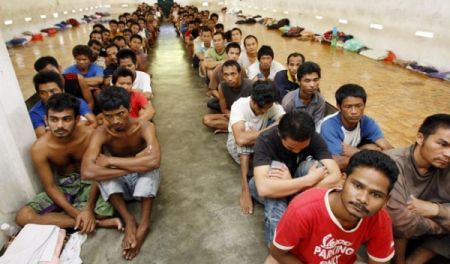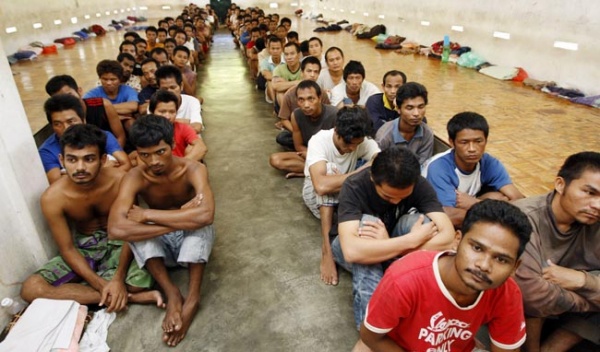About two weeks ago, on the 25th of July, Malaysia signed a refugee swap deal with Australia in sending 4000 processed refugees in return for 800 asylum seekers (or affectionately called ‘boat people’ by the Australian government) who tried to enter Australia illegally. This move has been widely criticized by human rights groups and its advocates.
Costing an estimated USD$320 mil over a period of four years, the deal is supposedly a “model for others to look at”, quipped Home Affairs Minister Hishammuddin Hussein at the joint press conference where the signing took place.
The question, however, lies not in whether Malaysia can subsequently benefit from signing such a deal but whether it can handle the pressure under the scrutiny of various human rights watchdogs and its associations. Secondly, how well Malaysia executes this deal over the next four years is crucial in how neighboring countries might perceive us in a different political climate.
It is needless to say that the rally on 9th July caused a minor but noticeable riff in the Asia-Pacific region and perhaps beyond. Is this nation now equipped for the task of handling asylum seekers in search for safehaven? Many do not seem to think so. Human Rights Watch Refugees Director, Bill Frelick argued that since Malaysia is neither signatory nor party of the 1951 UNHCR Refugee Convention, indicating Malaysia lacks credibility in its standards of handling refugees. There is an ongoing debate on how there remains a huge gap in how we treat refugees and asylum seekers in this country.

Under the 1951 Convention, a refugee is defined as:
“A person who owing to a well-founded fear of being persecuted for reasons of race, religion, nationality, membership of a particular social group or political opinion, is outside the country of his nationality and is unable or, owing to such fear, is unwilling to avail himself of the protection of that country […]”
It is precisely due to the fear harbored in their home countries that refugees seek refuge elsewhere and in return, the countries they flee to are expected to be in compliance with treatment stated in the Convention. As a result, protection and education for refugees, especially children, remains an important part of the Convention and it is these aspects that we may fail the test under UN standards since we have not yet ratified the Convention. Similarly, Australia is seen as shirking its burdens rather than sharing it. It has given the rest of the world the impression that neither Australia nor Malaysia has signed this deal for the wellbeing of these people, but touches upon a larger issue: economic and political standing.
This is what others view us as: taking the deal because “money talks” in order to pull forward to find ourselves amongst prolific countries such as Hong Kong, Korea or even Singapore. Likewise, the Australian PM is struggling to regain popularity in the polls over the recent implementation of carbon tax.
On the day of signing, protesters were seen outside the venue holding up signs, one curiously read: “we arrest, we detain, we deport” – an entirely ironic situation eroding all promise in humanitarian efforts on our part. Truly, it seems foolish on one hand, for the Australian government to think that they can circumvent strict immigration laws in their country just by signing a deal. The problem lies deeper than what a bilateral agreement can solve. For Malaysia, it casts the idea upon others that we are simply a “dumping ground” for these asylum seekers and refugees, as though they are mere goods. Additionally, an “empty political phrase” might lead to preferential treatment in addition to the 100,000 refugees (and growing) in Malaysia; our country seemingly eager for the good graces of other prospering nations.
The increasing number of refugees in Malaysia has already proven to be a difficult job to handle, and with the new deal signed, it will be even harder. Ensuring adequate protection of the refugees is left largely to the trust that there will be no mistreatment on the part of the authorities, although this seems shoddy in a long shot. More than a promise on the Australian side that asylum seekers will not be caned is needed so that Malaysia is to be trusted for this deal to be carried out successfully, so all we can do now is hope that this deal does more good to us than bad, fingers crossed that the authorities takes cautious steps ensuring we remain within human rights standards or forever be banished as a nation grappling to fight for social justice.


I love the Pokemon, there's this site here that I play every day because it contains several games of it and very cool photos, if you like me
I love the Pokemon, there's this site here that I play every day because it contains several games of it and very cool photos, if you like me